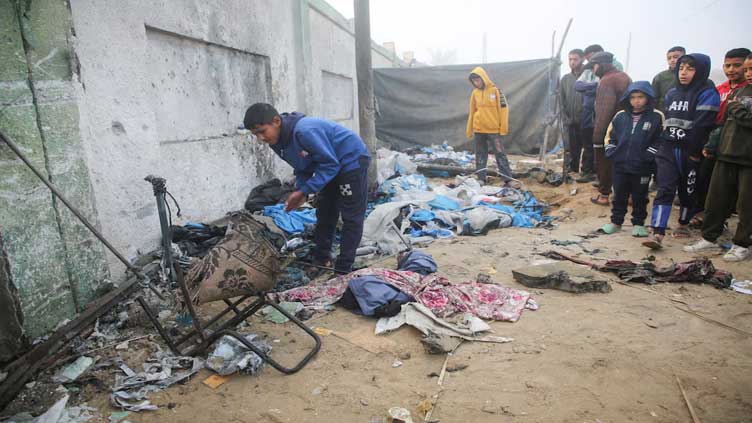Israeli security cabinet recommends Gaza ceasefire deal

World
Israeli security cabinet recommends Gaza ceasefire deal
JERUSALEM/CAIRO (Reuters) - The Israeli security cabinet has recommended approving the Gaza ceasefire and hostage return deal, ahead of a full cabinet meeting expected later on Friday, a statement from the prime minister's office said.
Cabinet is expected to meet at 3.30 p.m. (1330 GMT) to give final ratification to the agreement, which Prime Minister Benjamin Netanyahu said is expected to take effect on Sunday, with the release of the first hostages.
If successful, the ceasefire would halt fighting between Hamas and Israeli forces that has razed much of heavily urbanised Gaza, killed more than 46,000 people, and displaced most of the enclave's pre-war population of 2.3 million several times over, according to local authorities.
It could also ease hostilities in the Middle East, where the Gaza war spread to include Iran and its proxies - Lebanon's Hezbollah, Yemen's Houthis and armed groups in Iraq as well as the occupied West Bank.
In Gaza itself on Friday, Israeli warplanes kept up heavy strikes, and the Civil Emergency Service said that at least 101 Palestinians, including 58 women and children, had been killed since the deal was announced on Wednesday.
Under the six-week first phase of the three-stage deal, Hamas will release 33 Israeli hostages, including all women (soldiers and civilians), children, and men over 50.
Israel will release all Palestinian women and children under 19 detained in Israeli jails by the end of the first phase. The total number of Palestinians released will depend on the hostages released and could be between 990 and 1,650 Palestinians, including men, women, and children.
Hamas said in a statement on Friday that obstacles that arose about the terms of the Gaza ceasefire agreement have been resolved.
Israel's acceptance of the deal will not be official until it is approved by the country's security cabinet and government.
In the early hours of Friday, Netanyahu's office said that Israel's security cabinet would meet to give final approval to the ceasefire accord after the meeting was pushed back from Thursday, raising concerns about delays.
Ministers were summoned to a full cabinet meeting at 1330 GMT on Friday, an official with knowledge of the situation said, giving ample time for the ceasefire to begin on Sunday and the first hostages to be returned to Israel.
Israel blamed Hamas for the last-minute hold-up, while Hamas on Thursday said it was committed to the deal, which is scheduled to take effect on Sunday.
ACCORD REACHED ON HOSTAGES
"Prime Minister Benjamin Netanyahu was informed by the negotiating team that agreements have been reached on a deal to release the hostages," his office said in a statement.
Underscoring the potential obstacles facing a final ceasefire, hardliners in Netanyahu's coalition have opposed the deal as a capitulation to Hamas, which had controlled Gaza. National Security Minister Itamar Ben-Gvir threatened to resign if it was approved. However, he said he would not bring down the government.
His fellow hardliner, Finance Minister Bezalel Smotrich, has also threatened to quit the government if it does not go back to war to defeat Hamas after the first six-week phase of the ceasefire was completed.
Nevertheless, a majority of ministers were expected to back the agreement.
In Gaza, the airstrikes continued. In the aftermath of one strike on tents housing displaced people, a boy picked through damaged items on the floor that was littered with canned food and coffee pots.
That attack killed two people and wounded seven at an encampment close to Nasser Hospital in Khan Younis, according to medics.
Also in Khan Younis, mourners gathered around the body of a man killed in an Israeli strike as women hugged each other and cried.
"Life has become an unbearable hell," said resident Jomaa Abed al-Aal.
There was no comment from the Israeli military on the latest strikes.
HOSTAGE FAMILIES WANT SWIFT ACTION
Israel says 98 hostages are still being held in Gaza. About half are believed to be alive. They include Israelis and non-Israelis. Of the total, 94 were seized in the Oct. 7, 2023, Hamas-led attack on Israel and four have been held in Gaza since 2014.
For the first time, Israeli authorities have officially informed hostage families of the names of the first 33 to be released but it remains unclear how many of those on the list are still alive.
A group representing families of Israeli hostages in Gaza on Thursday urged Netanyahu to move forward quickly.
The ceasefire accord emerged on Wednesday after mediation by Qatar, Egypt and the United States, Israel's main supporter. As well as the release of hostages and Palestinian prisoners, the deal includes a gradual withdrawal of Israeli troops from Gaza.
It also paves the way for a surge in humanitarian aid for the coastal strip, where the majority of the population has been displaced and faces hunger, sickness and cold.
A World Health Organization official said on Friday it should be possible to scale up aid imports into Gaza massively to about 600 trucks a day under the terms of the deal.
The aid surge requires more than a 10-fold daily increase in lorries from the daily average of 51 that UN data shows entered the enclave in early January.
"I think the possibility is very much there and specifically when other crossings will be opened up," Rik Peeperkorn, WHO representative for the Occupied Palestinian Territory, told a press briefing in Geneva. "This can be built up very rapidly."
Israel launched its campaign in Gaza after Hamas-led gunmen burst into Israeli border-area communities on Oct. 7, 2023, killing 1,200 soldiers and civilians and abducting over 250 hostages, according to Israeli tallies.


